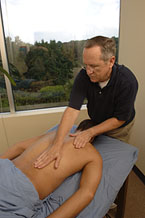CAM and Fibromyalgia: At a Glance

© istockphoto.com/hidesy
On this page:
- Introduction
- About Fibromyalgia
- What the Science Says About CAM and Fibromyalgia
- CAM Practices Used for Fibromyalgia
- NCCAM Research on Fibromyalgia
- Selected References
- For More Information
Introduction
People with chronic health conditions such as fibromyalgia often turn to some form of complementary and alternative medicine (CAM)—a group of diverse medical and health care systems, practices, and products that are not presently considered to be part of conventional medicine. This fact sheet provides basic information on fibromyalgia and "what the science says" about the effectiveness of CAM practices that many people with fibromyalgia use. If you are considering a CAM therapy for fibromyalgia, this information can help you talk to your health care provider about it.
About Fibromyalgia
Fibromyalgia is a disorder that causes muscle pain and fatigue. People with fibromyalgia have chronic widespread pain, as well as "tender points" on the neck, shoulders, back, hips, arms, and legs, which hurt when slight pressure (about 9 pounds) is applied.
People with fibromyalgia may also have other symptoms, such as:
- Trouble sleeping
- Morning stiffness
- Headaches
- Problems with thinking and memory (sometimes called "fibro fog")
- Irritable bowel syndrome.
Women with fibromyalgia may also have painful menstrual periods. Fibromyalgia may also be associated with depression.
The causes of fibromyalgia are unknown, but problems with the nervous system could be involved. It is estimated that fibromyalgia affects as many as 1 in 50 Americans. Most people with fibromyalgia are women, and most are diagnosed during middle age. However, men and children also can have the disorder.
CAM Practices Used for Fibromyalgia
Conventional therapies for fibromyalgia are limited, and research shows that about 90 percent of people with fibromyalgia use some form of CAM. CAM practices used by people with fibromyalgia include:
- Acupuncture
- Biofeedback
- Chiropractic care
- Hypnosis
- Magnesium supplements
- Magnet therapy
- Massage therapy
- SAMe (S-Adenosyl-L-Methionine)
- Tai chi.
What the Science Says About CAM and Fibromyalgia
According to reviewers who have assessed the research on CAM and fibromyalgia, much of the research is still preliminary, and evidence of effectiveness for the various therapies used is limited.
- Research on acupuncture—stimulation of anatomical points with thin metallic needles—for fibromyalgia has produced mixed results. One review article notes that three studies found some evidence to support the use of electroacupuncture (in which the needles are pulsed with electric current). However, the effects of electroacupuncture in these studies were mostly short lived, and two studies of traditional acupuncture had negative results.
- Some researchers believe that low levels of magnesium may contribute to fibromyalgia. However, there is no conclusive scientific evidence that magnesium supplements relieve fibromyalgia symptoms. Two small studies had conflicting results.
- A review of the research on massage therapy for fibromyalgia notes only modest, preliminary support. Two studies had some positive findings, but two others found either no benefits or only short-term improvements.
- Supplements containing the amino acid derivative SAMe are used for a variety of conditions. Although several small studies of SAMe for fibromyalgia have had mixed results, there is some evidence of a benefit. Reviewers conclude that more research is needed.
- Finally, according to reviewers, research evidence is insufficient to draw conclusions about the effectiveness of other CAM treatments—biofeedback, chiropractic care, hypnosis, and magnet therapy—used for fibromyalgia.
NCCAM Research on Fibromyalgia
The National Center for Complementary and Alternative Medicine (NCCAM) funds clinical trials that look at CAM for fibromyalgia. Recent projects include studies of:
- The effects of tai chi on fibromyalgia patients' musculoskeletal pain, fatigue, sleep quality, psychological distress, physical performance, and health status
- Brain-imaging techniques for determining whether acupuncture relieves pain due to fibromyalgia
- The effectiveness of a form of electroencephalograph (EEG) biofeedback in treating fibromyalgia.
If You Are Considering CAM for Fibromyalgia
- Talk to your health care providers. Tell them about the therapy you are considering and ask any questions you may have. They may know about the therapy and be able to advise you on its safety, use, and likely effectiveness in relieving your fibromyalgia symptoms.
- If you are considering a practitioner-provided CAM therapy such as acupuncture, check with your insurer to see if the services will be covered, and ask a trusted source (such as your fibromyalgia doctor or a nearby hospital or medical school) to recommend a practitioner. Although acupuncture treatment is generally safe, complications can result if needles are not adequately sterilized or if the treatment is not properly delivered.
- If you are considering dietary supplements, keep in mind that they can act in the same way as drugs. They can cause medical problems if not used correctly or if used in large amounts, and some may interact with medications you may take. The health care providers you see about your fibromyalgia can advise you.
- Tell all your health care providers about any complementary and alternative practices you use. Give them a full picture of what you do to manage your health. This will help ensure coordinated and safe care. For tips about talking with your doctor about CAM, see information on our Time to Talk campaign.
Selected References
- Arnold LM. Biology and therapy of fibromyalgia: new therapies in fibromyalgia. Arthritis Research and Therapy. 2006;8(4):212.
- Clauw DJ, Crofford LJ. Chronic widespread pain and fibromyalgia: what we know, and what we need to know. Best Practice and Research Clinical Rheumatology. 2003;17(4):685–701.
- Fibromyalgia and related conditions: levels of scientific evidence for specific therapies. Natural Standard Database Web site. Accessed on December 17, 2007.
- Goldenberg DL, Burckhardt C, Crofford L. Management of fibromyalgia syndrome. Journal of the American Medical Association. 2004;292(19):2388–2395.
- Harris RE, Clauw DJ. How do we know that the pain in fibromyalgia is "real"? Current Pain and Headache Reports. 2006;10(6):403–407.
- Holdcraft LC, Assefi N, Buchwald D. Complementary and alternative medicine in fibromyalgia and related syndromes. Best Practice and Research Clinical Rheumatology. 2003;17(4):667–683.
- Mayhew E, Ernst E. Acupuncture for fibromyalgia: a systematic review of randomized clinical trials. Rheumatology. 2007;46:801–804.
- National Institute of Arthritis and Musculoskeletal and Skin Diseases. Questions and Answers About Fibromyalgia. National Institute of Arthritis and Musculoskeletal and Skin Diseases Web site. Accessed on March 14, 2008.
- Natural medicines in clinical management of fibromyalgia: clinical management series. Natural Medicines Comprehensive Database Web site. Accessed on December 13, 2007.
- Sarac AJ, Gur A. Complementary and alternative medical therapies in fibromyalgia. Current Pharmaceutical Design. 2006;12(1):47–57.
- Sim J, Adams N. Systematic review of randomized controlled trials of nonpharmacological interventions in fibromyalgia. The Clinical Journal of Pain. 2002;18(5):324–336.
- Tsao JC. Effectiveness of massage therapy for chronic, non-malignant pain: a review. Evidence-Based Complementary and Alternative Medicine. 2007;4(2):165–179.
- Wolfe F, Smythe HA, Yunus MB, et al. The American College of Rheumatology 1990 criteria for the classification of fibromyalgia. Report of the Multicenter Criteria Committee. Arthritis and Rheumatism. 1990;33(2):160–172.
For More Information
NCCAM Clearinghouse
The NCCAM Clearinghouse provides information on CAM and NCCAM, including publications and searches of Federal databases of scientific and medical literature. The Clearinghouse does not provide medical advice, treatment recommendations, or referrals to practitioners.
Toll-free in the U.S.: 1-888-644-6226
TTY (for deaf and hard-of-hearing callers): 1-866-464-3615
Web site: nccam.nih.gov
E-mail:
PubMed®
A service of the National Library of Medicine (NLM), PubMed contains publication information and (in most cases) brief summaries of articles from scientific and medical journals. CAM on PubMed, developed jointly by NCCAM and NLM, is a subset of the PubMed system and focuses on the topic of CAM.
Web site: www.ncbi.nlm.nih.gov/sites/entrez
CAM on PubMed: nccam.nih.gov/camonpubmed/
National Institute of Arthritis and Musculoskeletal and Skin Diseases (NIAMS), NIH
NIAMS supports research into the causes, treatment, and prevention of arthritis and musculoskeletal and skin diseases; the training of scientists; and the sharing of research-based information.
Web site: www.niams.nih.gov
Toll-free in the U.S.: 1-877-22-NIAMS
NIH National Library of Medicine's MedlinePlus
Fibromyalgia listing: www.nlm.nih.gov/medlineplus/fibromyalgia.html
This publication is not copyrighted and is in the public domain. Duplication is encouraged.
NCCAM Publication No. D413
Created July 2008
Note: PDF files requires a viewer such as the free Adobe Reader.


